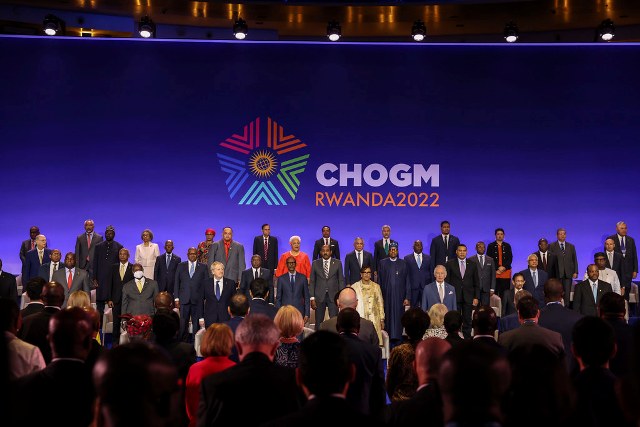 June 2022: Prince Charles with leaders at the Commonwealth Heads of Government Meeting in Kigali. [photo: Commonwealth Secretariat]
June 2022: Prince Charles with leaders at the Commonwealth Heads of Government Meeting in Kigali. [photo: Commonwealth Secretariat]
[This is an excerpt from an article in The Round Table: The Commonwealth Journal of International Affairs.]
Is the survival of the Commonwealth threatened by collateral damage, with dominoes falling as more of the 15 countries where Charles III is head of state become republics, and younger people in Britain lose interest in a monarchy in the UK? If it goes, would it matter?
Critics have long debated whether the British monarchy depends on what now looks like a hereditary headship of the Commonwealth, or Commonwealth survival depends on media and public interest in the British Crown. The late Prince Philip remarked in Canada that if Canadians didn’t want a British Head of State, royalty would happily depart, and royal visitors have been present at republican independence celebrations at least since 1957, when Princess Alexandra was cheered on the streets of Accra as Ghana broke with the monarchy. There is nothing to stop other republican presidents welcoming a British republic into the Commonwealth, if British voters so decide.
To answer ‘does it matter?’ one has to strip out both the soap opera surrounding the British royal family, and the lacklustre performance of the Commonwealth Secretariat in recent years, denuded of investment by its biggest funders – Australia, Britain and Canada – and without the Indian finance and interest which has led to its takeover of international cricket. The distancing of Canada, since the Sri Lankan summit of 2013, which challenged all the human rights aspirations in the charter signed by the late Queen in that year, is especially notable. Canada provided Arnold Smith, first Secretary-General, was a key funder of the Commonwealth Fund for Technical Co-operation (CFTC), a small development offshoot, and led the anti-racism charge when white South Africa was forced to leave the Commonwealth in 1961.
Religion and Commonwealth values – Introduction
2023 – Special edition of The Round Table: The Commonwealth Journal of International Affairs
2005 – Special edition: Religion, conflict and conflict resolution in the Commonwealth
For 56 governments, the modern Commonwealth is mostly about realpolitik, not sentiment or values. Small states, well over half the membership, see it as a way to push their own agendas, on trade and climate change, with larger ones. For some, like Guyana and Belize, it is a shield against predatory neighbours, Venezuela and Guatemala, respectively. For Cyprus and Bangladesh, where the past is still present, it is foundational. For the large African contingent, expanded in murky circumstances last year by the arrival of Togo and Gabon, two hereditary Francophone dictatorships, it adds muscle on the world stage. When Nigeria returned to democracy in 1999 it provided tools and goodwill, though South Africa has made less use of it since the departure of Nelson Mandela, an enthusiast who appreciated its role in the anti-apartheid struggle.
Geography explains much. Australia and New Zealand have interests among the small Pacific states, now being courted by China. Canada, and Canadian banks, are players in the Caribbean. India has traditionally been keener on the UN, but geopolitical desire to checkmate China suggests a modest rise in interest, especially now that India has its own special relationship with the US. More important to India is ‘the Quad’, the association of India, Australia, Japan and the US for defence in the Indo-Pacific region. SAARC, the South Asian Association for Regional Cooperation, founded in 1985, remains stymied by Indo-Pakistani rivalry.
Richard Bourne is an Emeritus member of the Round Table editorial board.



